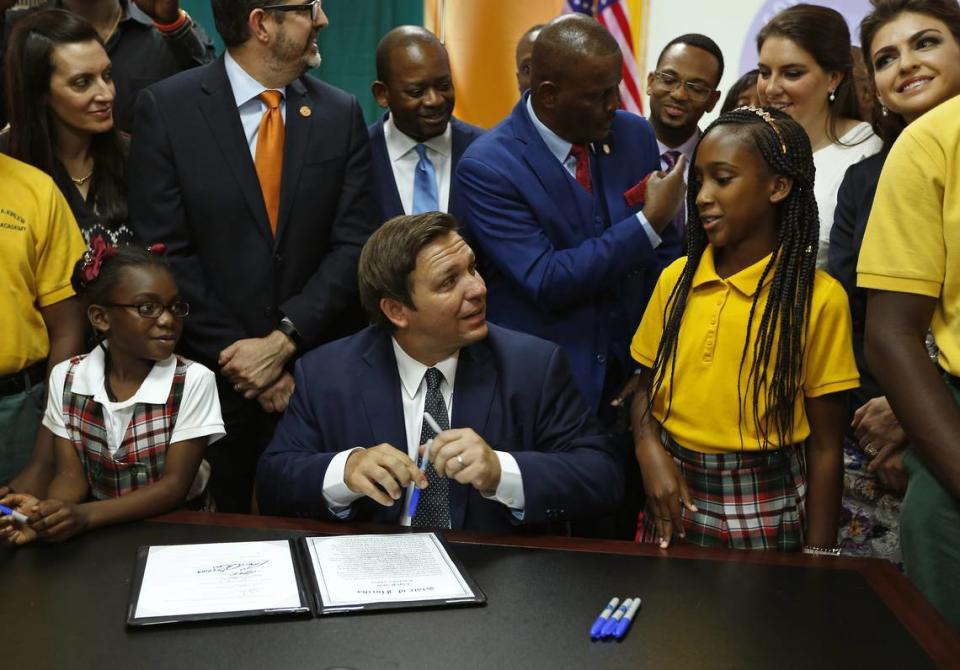Florida lawmakers reach agreement on $200M school choice expansion
Florida lawmakers on Thursday reached a deal on a sweeping $200 million school-choice proposal that would combine and significantly expand the state’s voucher programs that help families pay for private schooling.
After months of negotiations, House and Senate leaders agreed on legislation that would pave the way for about 61,000 new students to qualify for taxpayer-funded vouchers, a push that Democrats fought as they advocated for more oversight and accountability for private schools that will be getting state-funded vouchers.
Republican leaders in both chambers, however, have been steadfast on their decades-long push to expand school choice in Florida and on Thursday agreed on legislation that would make a series of changes to the state’s school-choice infrastructure.
If signed into law, the legislation would fold voucher programs for students with special needs — the Gardiner Scholarship and the John M. McKay Scholarship — into the Family Empowerment Scholarship, the state’s newest voucher program that serves a broader population of low- to middle-income families.
The measure would also raise the income eligibility cap. It would allow families of four with an income of nearly $100,000 to qualify for Family Empowerment awards, up from the current $79,500 income threshold. And students would no longer need to attend a public school before receiving a state voucher, the bill says.
Furthermore, the bill would allow Family Empowerment vouchers to be spent on additional educational expenses, including technology and internet services, on top of private school tuition. Students with special needs who receive vouchers could spend the money on even more expenses, including specialized therapies, which is currently allowed for Gardiner Scholarship recipients.
Those provisions are part of the compromise lawmakers reached on the big-ticket education item. The resolution came after the Senate agreed to take up the House bill, a version that is poised to pass the Senate as early as Friday.
By taking up the House bill, the Senate is curtailing the plan it initially proposed at the start of the legislative session.
Sen. Manny Diaz Jr., a Hialeah Republican who sponsored the Senate bill, had proposed what many advocates consider to be the holy grail in the school-choice movement: education savings accounts for students.
His proposal would have merged the state’s five key school voucher programs, make them all state-funded, and convert them into educational savings accounts that families could use to pay for private tutoring, therapy, private schooling and even college savings.
But the massive undertaking fizzled, largely due to key differences in the funding.
For the Senate’s proposal to work, the Legislature needed to create a trust fund to collect corporate donations and state funds to pay for vouchers. The House did not want to go that far.

But now that the policy differences have been settled, the $200 million school choice effort is a “resolved issue on the budget,” Diaz told the Herald/Times in an interview Wednesday.
House and Senate leaders, however, have not formally closed out the budget item as they try to piece together a near-$100 billion budget for the 2021-22 fiscal year.
More changes, more vouchers and more concerns
Some parents fear that merging the Gardiner and the McKay scholarship programs, which serve students with special needs, with the Family Empowerment program, which serves a broader population of students, could shut out awards for children with the most needs.
Camille Gardiner, the wife of former Senate President Andy Gardiner, led the opposition on the change during the legislative session. The program is named after Andy Gardiner, whose son, Andrew, has Down syndrome.
During a House committee discussion, Camille Gardiner said the bill will have “many unintended consequences.”
“This will be the beginning of chipping away at something this Legislature set up to support our fellow citizens that have children with the most significant disabilities,” she said.
Merging the Gardiner and McKay scholarship program means the vouchers for students with special needs will be funded through the state funding that is distributed based on enrollment, rather than through its own separate budget line.
Rep. Randy Fine, R-Palm Bay, the sponsor of the House bill, and Diaz have defended the changes to the program and say that all students currently benefiting from Gardiner scholarships will be “grandfathered in,” and will not get less than what they are getting now.
“If you are the parent of a child with special needs you are going to be fearful of any change,” Fine said, but noted that “no student is hurt” under the bill and that “many students are getting more” money.
Camille Gardiner told the Orlando Sentinel that the “grandfathered in” provision in the bill confirms parents’ worries.
“That means something is coming that is not good,” she said.
But Diaz says that is not the case, arguing that the bill will protect current students with the most needs and that awards will be calculated based on the student’s disability.
“So the kids who have higher, or more disabilities, they will get a higher amount,” Diaz said.
Democrats, meanwhile, have raised concerns that the legislation will further shift funding away from traditional public schools and give state funds to private schools that do not have to abide by the same accountability standards as public schools.
Rep. Robin Bartleman, D-Weston, a former Broward County school board member and educator, tried to add language that would have required private schools to meet the state’s accountability standard if they receive more than 10% of their full-time equivalent student funding from state-funded vouchers.
“To say we are going to let the money follow the child to a voucher school and to let them spend the money on whatever they want is ridiculous,” Bartleman said.
House Republicans voted down the language earlier this week, with Fine saying many private schools already voluntarily meet state standards and are “doing the right thing.”
“I just wish that we would require them rather than assume they are going to do the right thing,” Bartleman said.

